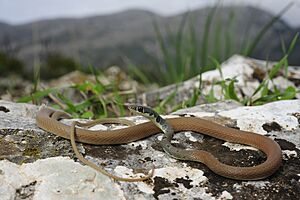Platyceps najadum facts for kids
Quick facts for kids Platyceps najadum |
|
|---|---|
 |
|
| Conservation status | |
| Scientific classification |
|
| Kingdom: | Animalia |
| Phylum: | Chordata |
| Class: | Reptilia |
| Order: | Squamata |
| Suborder: | Serpentes |
| Family: | Colubridae |
| Genus: | Platyceps |
| Species: |
P. najadum
|
| Binomial name | |
| Platyceps najadum (Eichwald, 1831)
|
|
| Script error: The function "autoWithCaption" does not exist. | |
| Synonyms | |
|
|
Script error: No such module "Check for conflicting parameters".
Platyceps najadum, often called the Dahl's whip snake or the slender whip snake, is a type of snake. It belongs to the Colubridae family. This snake lives in Eurasia. Scientists recognize four different kinds, or subspecies, of this snake.
Contents
Where It Lives
The Dahl's whip snake can be found in many places. These include the Balkans, the Aegean Sea area, and Cyprus. It also lives in the Middle East and as far as Turkmenistan and the Caucasus Mountains.
Snake Habitats
This snake likes dry and dry, desert-like places. It lives in many different environments. You might find it in deserts, rocky areas, or forests. It also lives in woodlands and farmland. These snakes can live from sea level up to about 6,560 feet (2,000 meters) high. They are often seen in fields and sometimes on roads.
What It Looks Like
The Dahl's whip snake has a very thin body. It is usually not much longer than 39 inches (1 meter) in total length. This measurement includes its tail.
Reproduction and Life Cycle
The Dahl's whip snake is an egg-laying species. This means the female snake lays eggs. She usually lays between 3 and 16 eggs in one group, called a clutch.
Types of Dahl's Whip Snake
There are four known types, or subspecies, of this snake. One of these is the main type, called the nominotypical subspecies.
- Platyceps najadum albitemporalis (Darevsky & Orlov, 1994)
- Platyceps najadum dahlii (Fitzinger, 1826) – This type is found in the Balkans, Cyprus, and Aegean Turkey.
- Platyceps najadum kalymnensis (B. Schneider, 1979) – This type only lives on Kalymnos island in the Aegean Sea.
- Platyceps najadum najadum (Eichwald, 1831) – This type lives in the Caucasus and Asia Minor.
Snake Names
The subspecific name dahlii and the common name "Dahl's whip snake" honor an Austrian bug scientist named Georg Dahl. He found the first snake of this type in 1824.
Another subspecific name, schmidtleri, honors a German reptile scientist named Josef Friedrich Schmidtler.
Local Names
People in different places have their own names for this snake:
 | Aaron Henry |
 | T. R. M. Howard |
 | Jesse Jackson |


